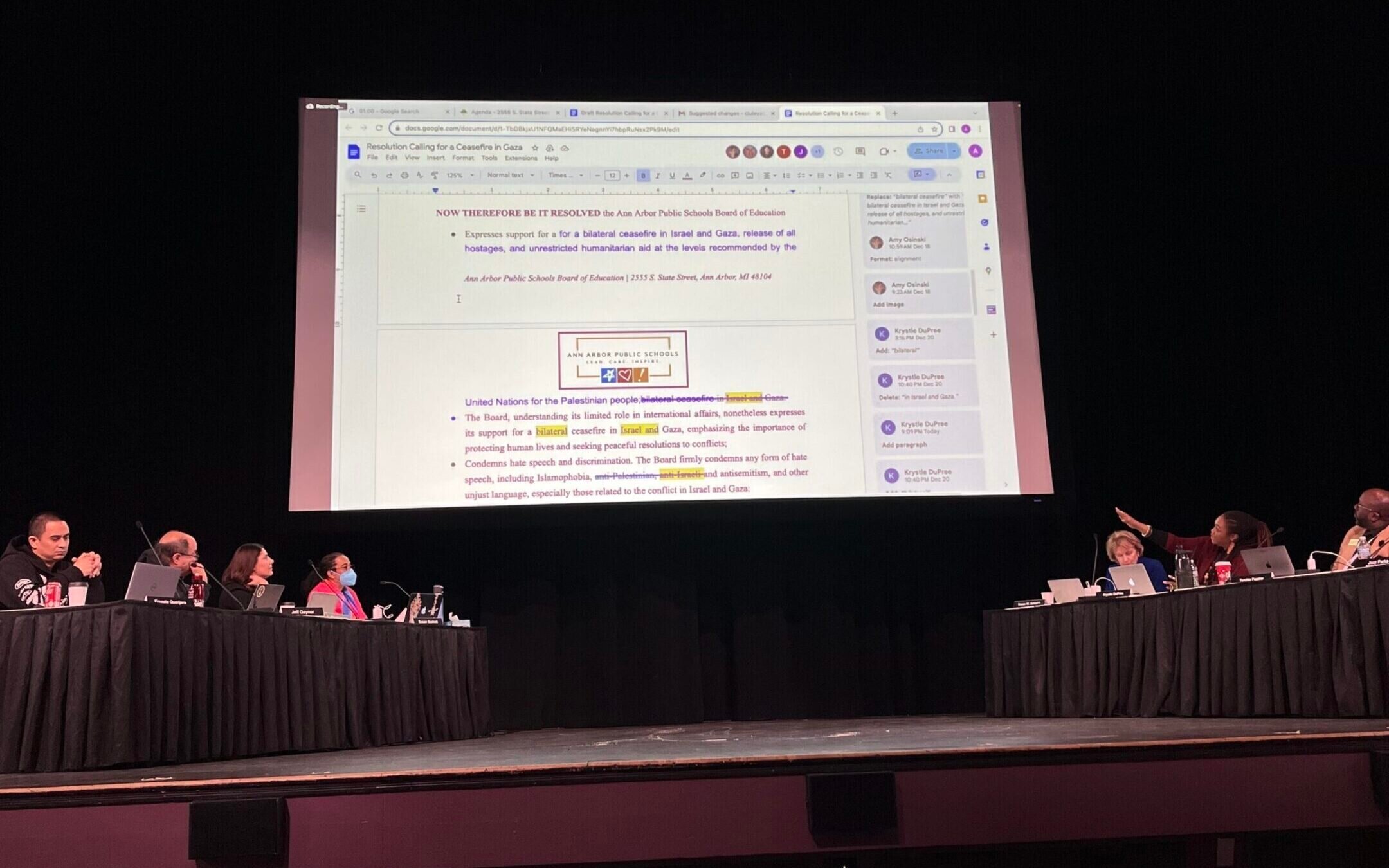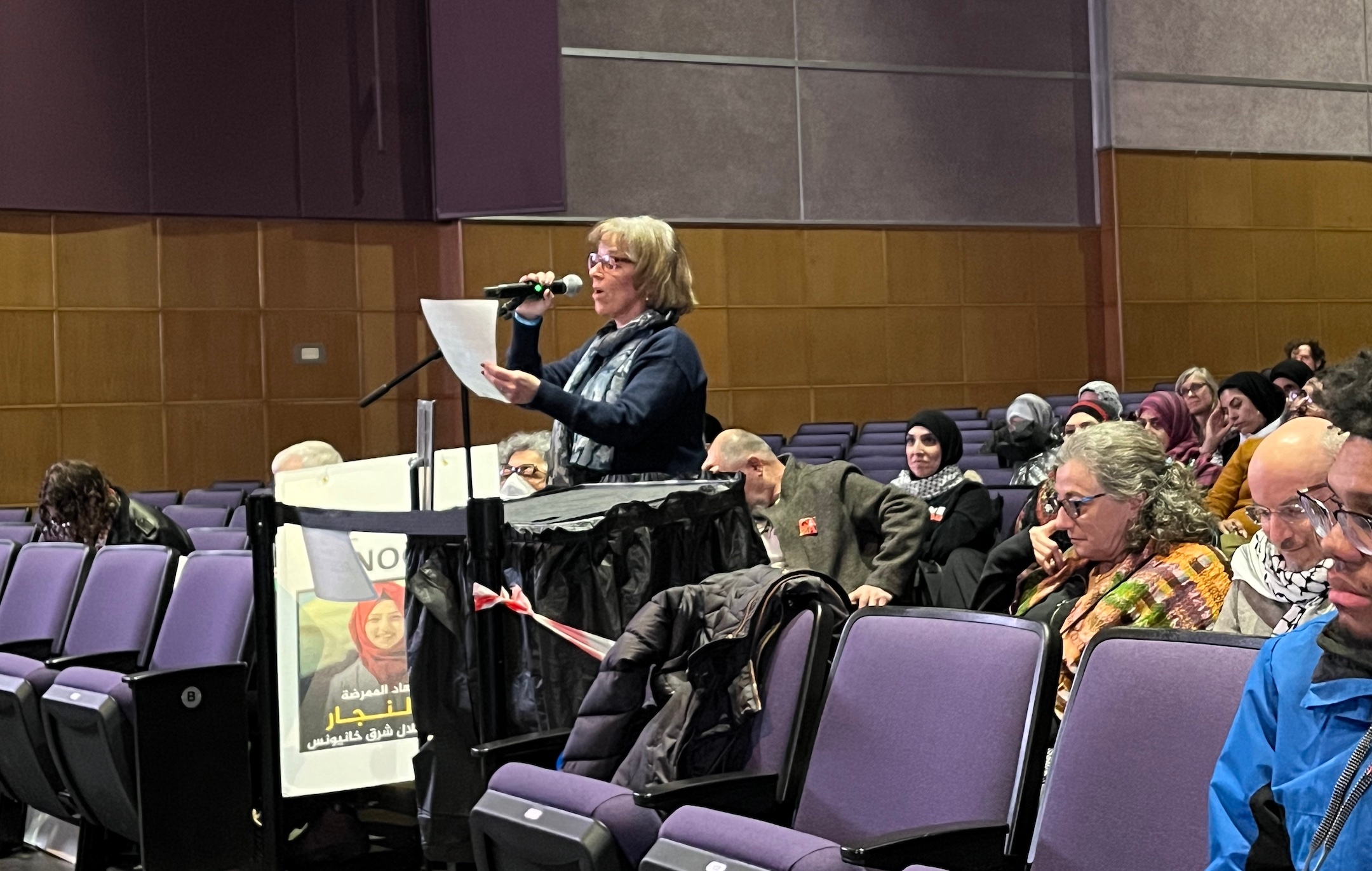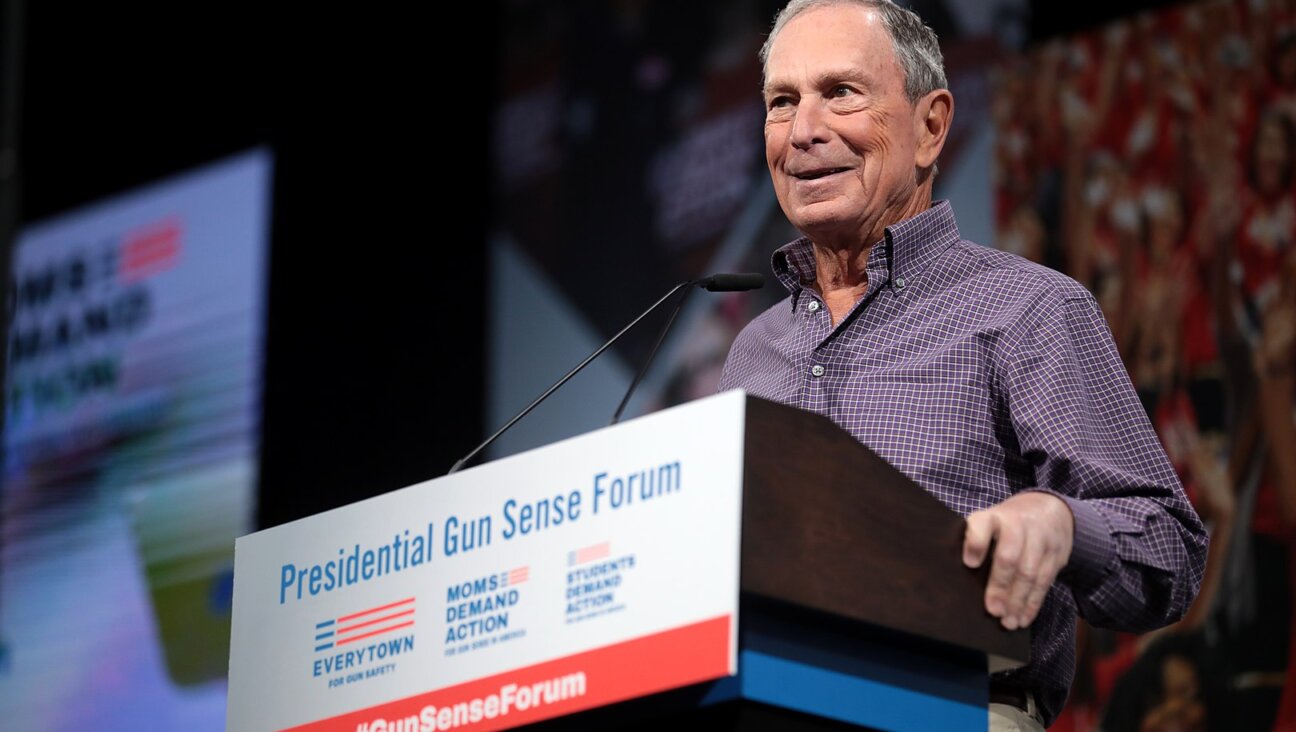Ann Arbor school board endorses call for cease-fire in Israel and Gaza
The vote followed a contentious meeting and made the Michigan district one of the first in the United States to pass a ceasefire resolution

Members of the Ann Arbor Public Schools board wordsmithed a resolution calling for a ceasefire in the Israel-Hamas war, Jan. 18, 2023. (Andrew Lapin)
ANN ARBOR, Michigan (JTA) – The school board in this city endorsed a resolution calling for a cease-fire in the Israel-Hamas war early Thursday morning, more than five hours after convening for a meeting was expected to be contentious.
The vote made Ann Arbor Public Schools one of the only school districts in the United States to adopt such a stance, three months after Hamas’ Oct. 7 attack on Israel ignited a war in Gaza and fierce debates in public bodies across the United States.
Several last-minute amendments tweaked the resolution’s language to note that the board has a “limited role in international affairs” and call for the “release of all hostages and unrestricted humanitarian aid at the levels recommended by the United Nations for the Palestinian people.” Another tweak condemned “discrimination against any individual based on personal background whether Israeli or Palestinian.”
The final version, after prodding from Jewish community members, also condemns both antisemitism and “anti-Jewish racism.”
The changes were enough to tilt the board to favor the resolution, which only three of the seven members had said before the meeting that they were committed to support. Four members backed the resolution, while one person voted against it, down from two who had said they planned to.
Two others abstained — a move that one board member said was not encouraged, but which another said was essential because the board was taking a stand on something outside its purview. Applause and cries of “Thank you” broke out in the high school auditorium after the motion passed.
“I’m very disappointed,” Eileen Freed, head of the Ann Arbor Jewish federation, told the Jewish Telegraphic Agency after the vote. “At the crux of it, it’s a political play. … The people who were pushing for this wanted to see the words ‘cease-fire.’ They were not focused on the needs of the students.”
Cease-fire calls have been a frontier of tensions across the United States since the early days of the war. Proponents say calling for a cease-fire represents a powerful symbolic stand against Israel’s conduct in Gaza. Critics of the calls — including Israeli leaders and many Jewish leaders in the United States — say they effectively deny Israel the right to defend itself.

Eileen Freed, executive director of the Jewish Federation of Greater Ann Arbor, delivers public comments opposing a cease-fire resolution at a local school board meeting, Jan. 17, 2023. (Andrew Lapin)
At least one other school district has officially called for a cease-fire, the New Haven Unified School District in California’s Bay Area, as has Randi Weingarten, the progressive Jewish leader of the American Federation of Teachers union who also sits on the board of the liberal Zionist group J Street. Weingarten tweeted earlier this month that she believed it was “well past time for a cease-fire agreement.”
The vote capped a contentious period for Ann Arbor, a progressive Michigan community with sizable Jewish and Arab populations. The Ann Arbor City Council passed its own cease-fire resolution last week. The local Council on American Islamic Relations has filed a federal civil rights complaint with the Department of Education against the district, alleging that a middle school counselor called a student a “terrorist.”
And at the University of Michigan, the president halted two planned student government votes about Gaza, saying that they had stoked fear in the community. Meanwhile, dozens of pro-Palestinian protesters were arrested after storming an administration building, causing the Board of Regents this week to pass new free-speech rules.
For the local school board, the cease-fire vote followed a month of debate that occupied members even as they conducted a superintendent search and contended with longstanding equity issues. Both topics were raised briefly but not tackled at the board meeting; one member, making an unsuccessful case to table the resolution, said the tensions over Israel and Gaza were scaring away high-quality superintendent candidates.
“Where else have I heard people told, ‘Stay in your place’?” Jeff Gaynor, a Jewish board member who supported the resolution, told JTA before the meeting. He then quoted Martin Luther King Jr.: “The time is always right to do what is right.”
Gaynor and Rima Mohammad, a Palestinian board member whose term as president coincidentally ended during the meeting, were the most vocal advocates of a cease-fire. The two issued a joint statement in the days after the Oct. 7 attacks reading, “We stand together, as a Jew and a Palestinian, in the interest of our common humanity.”
During the meeting, Gaynor said his Jewish background led him to call for an end to Israel’s war in Gaza.
“During my five years of Hebrew School leading up to my bar mitzvah, I donated money to plant trees in Israel. Much of my moral compass is based on what I learned during sermons in synagogue every Saturday morning,” he said, adding, “I will not defend Hamas; it is not an agent for peace. Neither is Netanyahu’s government.” (During the public comment period, one Jewish speaker called Gaynor a “shonda,” the Yiddish word meaning shame.)
“I hope we continue the dialogue,” Gaynor told JTA after the motion passed. “There’s a lot of repairing to do, a lot of empathy to be had.” Asked what he thought of the resolution’s final wording after the amendments, he said, “It was fine.”
Mohammad argued sharply against the resolution to table the resolution, saying that doing so would harm families like hers and communicate to those who argued for the resolution in public comments that their voices do not matter.
In total, 122 people signed up to speak at the meeting, including the head of the local Jewish federation, which opposed the cease-fire call and said it had “created a hostile atmosphere” in the district; several Jewish parents who said they felt hurt by the resolution; and representatives of the Detroit chapter of the anti-Zionist group Jewish Voice for Peace.
Jewish opponents of the resolution carried signs reading “Focus on Education” and “Slippery Slope,” while pro-Palestinian supporters held placards reading “Stop Funding Genocide” and “We Are Against U.S. Military Aid to Israel.”
“We feel marginalized, we feel scared,” Josh Rubin, a Jewish parent in Ann Arbor, said during his public comment period, adding that he and his family were planning to move away because they no longer felt safe sending their children to school.
Several times, two longtime local pro-Palestinian activists were reprimanded but not removed for interrupting speakers, insulting board members, and attempting to start chants of “From the river to the sea, Palestine will be free”; others cheered or booed speakers on both ends of the debate.
Voices opposing the resolution were outnumbered by the pro-Palestinian speakers and supporters, including several district teachers who signed a petition supporting the resolution; some Palestinian-American students; a Palestinian district parent who said many of his relatives had been killed in Gaza; and a speaker who played an audio clip of what they said were children inside a hospital in Gaza being bombed.
“This is not helpful to anyone,” Marla Linderman Richelew, a Jewish local civil rights attorney and past president of the parent-teacher association of one of the high schools, told JTA before rising to speak against the resolution. Her daughter, she said, had been the victim of antisemitic bullying in the district when students filmed themselves telling her the Holocaust never happened, and she says the school district told her they didn’t have enough resources to address it.
“I think we are just confused. I think we’re all trying to figure out what to do and how to deal with this conflict that we did not even know we had,” she said about Jews in Ann Arbor. She added, “I think it’s going to be a learning experience for all of us.”
This article originally appeared on JTA.org.
A message from our Publisher & CEO Rachel Fishman Feddersen

I hope you appreciated this article. Before you go, I’d like to ask you to please support the Forward’s award-winning, nonprofit journalism so that we can be prepared for whatever news 2025 brings.
At a time when other newsrooms are closing or cutting back, the Forward has removed its paywall and invested additional resources to report on the ground from Israel and around the U.S. on the impact of the war, rising antisemitism and polarized discourse.
Readers like you make it all possible. Support our work by becoming a Forward Member and connect with our journalism and your community.
— Rachel Fishman Feddersen, Publisher and CEO




















